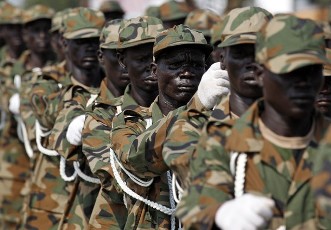South Sudan army in full control of Jau after heavy fighting with SAF – official
By Bonifacio Taban Kuich
Feburay 26, 2012 (BENTIU/KHARTOUM) – The Sudan People’s Liberation Army (SPLA), South Sudan’s official army, has fully captured the disputed Jau area from the Sudan Armed Forces (SAF) on Sunday, an official in Unity State told Sudan Tribune.

South Sudan lodged a complaint in December 2011 with the United Nations Security Council (UNSC) saying that SAF had occupied parts of South Sudan including Jau.
Mabeak Lang Bilkuei, commissioner of Pariang County said that taking control of Jau, is seen by by SPLA as a step towards preventing Sudan’s military invading, which he said claimed SAF had attempted on numerous occasions.
The official claimed that the SPLA has captured more than 15 Toyota Land Cruiser vehicles and heavy trucks from SAF.
“More bodies from Sudanese Armed Forces are laid on ground and this is a lesson to [Sudan President] Omer Bashir who threatened the Republic of South Sudan”, said Bilkuei.
SAF is battling rebels from Sudan People’s Liberation Movement North (SPLM-N) in the border states of South Kordofan and Blue Nile since last year.
Khartoum constantly accuses Juba of aiding the rebels in these states. It has also filed a protest with the UNSC on this.
Arop Riak Malual a Youth leader of Pariang county said that the entire county was “very happy” to heard that Jau is currently under SPLA control.
“I want to tell the people of Unity State particularly the Dinka Pariang to feel free after their national army won victory in Jau. All this time SAF was claiming to be men but today they appeared as women after their defeat from SPLA”, said Malual.
Officials at Bentiu hospital told Sudan Tribune on Sunday that four soldiers are being treated as a result of the battles between SAF and SPLA.
Pariang commissioner dismissed allegations made by SAF on the presence of SPLM-N in Jau. Like other disputed territories along the poorly defined, disputed and demarcated border, the name and spelling of the area differs. North Sudan refers the area as Jao or Jaw rather than Jau.
Commissioner Malual asserted that SAF have plans to take control of South Sudanese towns which have potential oil resources. When South Sudan seceded it took with it 75% of Sudan’s oil production. Most of the region’s oil fields straddle the north-south border and were the scene of intense conflict during the civil war that led to South Sudan’s independence.
JEM & SPLM-N SAYS IT ATTACKED JAU
On Sudany, the Darfur rebel group Justice and Equality Movement (JEM) released a statement saying that it launched a joint attack along with SPLM-N and other rebel groups managing to take over Jau and Tarogi after heavy fighting on Sunday.
The coalition of the three biggest rebel groups in Darfur and the SPLM-N – the Sudan Revolutionary Forces – led by Abdel-Aziz al-Hilu, the former deputy governor of South Kordofan, also gained a large cache of weapons in the aftermath.
SAF military spokesperson Al-Sawarmi Khalid Sa’ad confirmed the fighting saying that South Sudan’s army infiltrated six kilometres inside Sudanese territory, in an area known as Buhairat al-Obiyad.
“An alliance bringing together South Sudan’s army and rebels from South Kordofan and Darfur on Sunday morning attacked Buhairat Abiyad at Jao town,” said SAF in a statement.
SAF said that South Sudan set up an advanced command centre overseen by SPLA and Unity state governor Taban Deng to bring together all Darfur rebel groups in two sites.
Despite warnings by Sudan’s negotiating teams in Addis Ababa to their Southern counterparts, Juba continued their activities of supporting rebels, he said.
The army spokesman said that this violated the non-aggression pact signed this month between the two countries.
The agreement, which was reached under the mediation of the African Union (AU) in Addis Ababa, stipulated that the two sides should respect sovereignty and territorial integrity of each other, not intervene in each other’s internal affairs, reject the use of force and observe common interests and peaceful co-existence.
But JEM spokesperson Gibreel Adam Bilal dismissed the allegations of South Sudan’s involvement.
“These statements are clear evidence of the unwillingness of the government to recognise the ability of armed resistance to defeat it without external support and this is what it has kept repeating since 1989,” Gibreel told Sudan Tribune.
Khartoum and Juba have recently seen their relations deteriorate sharply over an oil dispute.
Juba suspended its entire oil production of around 350,000 barrels per day after Sudan started last year to confiscate oil from pipelines running through the north to its Red Sea port.
Khartoum says that it is simply getting its dues on unpaid invoices of South Sudan for oil transit fees.
The Sudanese president said in a TV interview this month that the current situation has brought the two countries closer to war.
South Sudan accused its northern neighbour this month of using militias at the its borders with the intention of sabotaging oil fields in the Unity State.
“Khartoum continues to use proxy war at the border and they have been bombing Jau while Militias are being pushed at the border to sabotage oil stations as an escalation,” said South Sudan’s Deputy Minister for Defence and Veteran Affairs, Majak Agoot this month.
Oil is the lifeline of both economies, but South Sudan is more vulnerable because it has almost no other industries to fall back on beyond the oil sector. It also relies heavily on imported goods which are brought in for a hefty premium on unpaved roads from Uganda, Kenya and Sudan. More than 90 percent of its goods come in that way.
Sudan on the other hand faced a sharp drop in income and foreign currency which pushed inflation rates higher and drove the exchange rate of the Sudanese pound to unprecedented low levels.
(ST)
